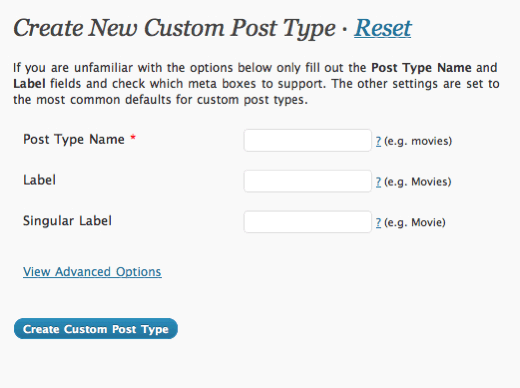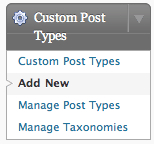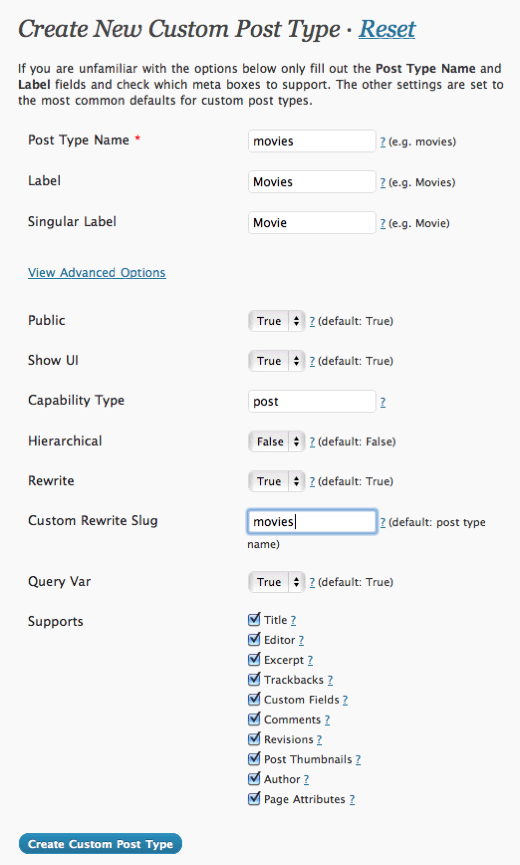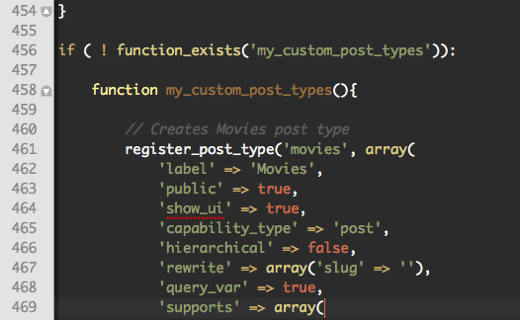How to use custom post types in WordPress 3.0
Since version 2.9, WordPress has introduced the ability to use custom post types. Now, in version 3.0, you can choose to create a panel for your custom post type, taking things a step further. In this tutorial, we will show you how to implement custom post types in your site into your WordPress site.
Create a custom post type – use plugins
Starting with version 3.0, WordPress does not have any built-in UI (user interface) to create custom post types. We can only use two options to create custom post types: plugins or hardcode them into the theme's functions.php file. First, let's see how to use plugins to create custom post types.
Custom post type UI

Custom Post Type UI is a plugin developed by Brad Williams from WebDevStudios, which allows you to easily create custom post types and taxonomy. One of the coolest features of this plugin is that it generates a code to create a custom post type so you can paste it into the functions.php file of the theme. One of the quirks of this plugin is the inability to share taxonomy among all post_types.

Click Add New Content from the Custom Post Type UI panel.

Next, you will see several options that need to be filled in. "Post Type Name" is the name of all posts used by WordPress to query such post_type. Tags will appear on the sidebar of the dashboard, just like the regular Publish menu. If you expand View Advanced Options, you will see more options that can be configured. Most are self-explanatory, such as "public" and "display UI". The first one is set to true to allow the display of the custom post type menu on the sidebar, and the other is set to true to generate the menu panel.
"Rewrite" allows custom post types to use SEO-friendly WordPress URLs (permanent links). "Custom Rewrite Slug" can be set to whatever you like. WordPress will use this slug to generate a permalink. So if we have a custom rewrite segment of example.com with "movies", your custom post type permalink will look like example.com/movies
WordPress's "Query Var" feature allows you to query posts for custom post types. So, if we use the example given earlier, to access a post titled My First Movie Post (written under Movies post_type), we can enter example.com/?movies=my-first-movie-post . So the query variable looks like this: ?posttypename
Finally, you can choose different features that custom post types support, such as thumbnails/featured images and excerpts.

Create a custom post type – use the Functions.php file

If you prefer to use custom post types without plugins, just add the following code to the theme's functions.php file:
// Creates Movies post typeregister_post_type('movies', array('label'=> 'Movies','public'=> true,'show_ui'=> true,'capability_type'=> 'post','hierarchical'=> false,'rewrite'=> array('slug'=> 'movies'),'query_var'=> true,'supports'=> array('title','editor','excerpt','trackbacks','custom-fields','comments','revisions','thumbnail','author','page-attributes',)) );Depend on
Use it with one click in WordPress
Let's analyze the code.
register_post_type( $post_type, $args): This function accepts two parameters, $post_type or the name of the post type, and $args, parameter array.
Tag: The plural name specified for the post type displayed in the admin panel sidebar.
Public: True/False. Allows the management UI to populate such posts.
show_ui : True/False. Show or hide the default UI that manages this post type.
ability_type: Default: post The post type used to check the read, edit, and delete functions.
Layered: Whether the post type is layered.
Rewrite: True/False. Default: true If you enter the slug parameter, the slug name will be added to the front of the post.
query_var: true/false Set the post type name to the query variable.
Support: Default: Different support features allowed by title and author settings post type.
Visit WordPress Codex to learn more about register_post_type() .
Show custom post types
To display posts with custom post types, add the following code in the loop. Replace "name" with the name of your post type. Note: You do not have to add a custom post type in the index.php file. You can create a custom WordPress page and run the following query in Loop.
$query= newWP_Query( 'post_type=name');
Depend on
Use it with one click in WordPress
To display posts of multiple post types, change the above code to the following. Change the movie with your custom post type name.
$query= newWP_Query( array( 'post_type'=> array( 'post', 'movies')) );
Depend on
Use it with one click in WordPress
The above code will show all posts for the regular post type (post) and custom post type (movie).
The above is the detailed content of How to use custom post types in WordPress 3.0. For more information, please follow other related articles on the PHP Chinese website!

Hot AI Tools

Undresser.AI Undress
AI-powered app for creating realistic nude photos

AI Clothes Remover
Online AI tool for removing clothes from photos.

Undress AI Tool
Undress images for free

Clothoff.io
AI clothes remover

Video Face Swap
Swap faces in any video effortlessly with our completely free AI face swap tool!

Hot Article

Hot Tools

Notepad++7.3.1
Easy-to-use and free code editor

SublimeText3 Chinese version
Chinese version, very easy to use

Zend Studio 13.0.1
Powerful PHP integrated development environment

Dreamweaver CS6
Visual web development tools

SublimeText3 Mac version
God-level code editing software (SublimeText3)

Hot Topics
 The top ten free platform recommendations for real-time data on currency circle markets are released
Apr 22, 2025 am 08:12 AM
The top ten free platform recommendations for real-time data on currency circle markets are released
Apr 22, 2025 am 08:12 AM
Cryptocurrency data platforms suitable for beginners include CoinMarketCap and non-small trumpet. 1. CoinMarketCap provides global real-time price, market value, and trading volume rankings for novice and basic analysis needs. 2. The non-small quotation provides a Chinese-friendly interface, suitable for Chinese users to quickly screen low-risk potential projects.
 okx online okx exchange official website online
Apr 22, 2025 am 06:45 AM
okx online okx exchange official website online
Apr 22, 2025 am 06:45 AM
The detailed introduction of OKX Exchange is as follows: 1) Development history: Founded in 2017 and renamed OKX in 2022; 2) Headquartered in Seychelles; 3) Business scope covers a variety of trading products and supports more than 350 cryptocurrencies; 4) Users are spread across more than 200 countries, with tens of millions of users; 5) Multiple security measures are adopted to protect user assets; 6) Transaction fees are based on the market maker model, and the fee rate decreases with the increase in trading volume; 7) It has won many honors, such as "Cryptocurrency Exchange of the Year".
 A list of special services for major virtual currency trading platforms
Apr 22, 2025 am 08:09 AM
A list of special services for major virtual currency trading platforms
Apr 22, 2025 am 08:09 AM
Institutional investors should choose compliant platforms such as Coinbase Pro and Genesis Trading, focusing on cold storage ratios and audit transparency; retail investors should choose large platforms such as Binance and Huobi, focusing on user experience and security; users in compliance-sensitive areas can conduct fiat currency trading through Circle Trade and Huobi Global, and mainland Chinese users need to go through compliant over-the-counter channels.
 Top 10 latest releases of virtual currency trading platforms for bulk transactions
Apr 22, 2025 am 08:18 AM
Top 10 latest releases of virtual currency trading platforms for bulk transactions
Apr 22, 2025 am 08:18 AM
The following factors should be considered when choosing a bulk trading platform: 1. Liquidity: Priority is given to platforms with an average daily trading volume of more than US$5 billion. 2. Compliance: Check whether the platform holds licenses such as FinCEN in the United States, MiCA in the European Union. 3. Security: Cold wallet storage ratio and insurance mechanism are key indicators. 4. Service capability: Whether to provide exclusive account managers and customized transaction tools.
 A list of top ten virtual currency trading platforms that support multiple currencies
Apr 22, 2025 am 08:15 AM
A list of top ten virtual currency trading platforms that support multiple currencies
Apr 22, 2025 am 08:15 AM
Priority is given to compliant platforms such as OKX and Coinbase, enabling multi-factor verification, and asset self-custody can reduce dependencies: 1. Select an exchange with a regulated license; 2. Turn on the whitelist of 2FA and withdrawals; 3. Use a hardware wallet or a platform that supports self-custody.
 Recommended top 10 for easy access to digital currency trading apps (latest ranking in 25)
Apr 22, 2025 am 07:45 AM
Recommended top 10 for easy access to digital currency trading apps (latest ranking in 25)
Apr 22, 2025 am 07:45 AM
The core advantage of gate.io (global version) is that the interface is minimalist, supports Chinese, and the fiat currency trading process is intuitive; Binance (simplified version) has the highest global trading volume, and the simple version model only retains spot trading; OKX (Hong Kong version) has the simple version of the interface is simple, supports Cantonese/Mandarin, and has a low threshold for derivative trading; Huobi Global Station (Hong Kong version) has the core advantage of being an old exchange, launches a meta-universe trading terminal; KuCoin (Chinese Community Edition) has the core advantage of supporting 800 currencies, and the interface adopts WeChat interaction; Kraken (Hong Kong version) has the core advantage of being an old American exchange, holding a Hong Kong SVF license, and the interface is simple; HashKey Exchange (Hong Kong licensed) has the core advantage of being a well-known licensed exchange in Hong Kong, supporting France
 Tips and recommendations for the top ten market websites in the currency circle 2025
Apr 22, 2025 am 08:03 AM
Tips and recommendations for the top ten market websites in the currency circle 2025
Apr 22, 2025 am 08:03 AM
Domestic user adaptation solutions include compliance channels and localization tools. 1. Compliance channels: Franchise currency exchange through OTC platforms such as Circle Trade, domestically, they need to go through Hong Kong or overseas platforms. 2. Localization tools: Use the currency circle network to obtain Chinese information, and Huobi Global Station provides a meta-universe trading terminal.
 Summary of the top ten Apple version download portals for digital currency exchange apps
Apr 22, 2025 am 09:27 AM
Summary of the top ten Apple version download portals for digital currency exchange apps
Apr 22, 2025 am 09:27 AM
Provides a variety of complex trading tools and market analysis. It covers more than 100 countries, has an average daily derivative trading volume of over US$30 billion, supports more than 300 trading pairs and 200 times leverage, has strong technical strength, a huge global user base, provides professional trading platforms, secure storage solutions and rich trading pairs.






